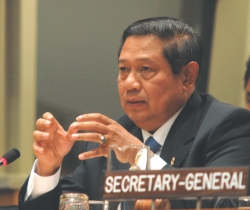| Home - Back Issues - The Team - Contact Us |
 |
| Volume 11 |Issue 37| September 21, 2012 | |
|
|
Neighbours Death Penalty for Graft
Indonesia's biggest Muslim organisation Nahdlatul Ulama's (NU) proposals for the death penalty for corruption convicts and civil disobedience against paying taxes fully reflects the public's frustration and anger over the widespread graft and fury against the government's miserable failure to deal firmly with the problem. We share the NU opinion, as asserted by one of its senior clerics Saifuddin Amsir at the opening of the organisation's national conference in Cirebon, West Java, on Saturday, that corruption is destroying the nation and systematically killing the people. Corruption has been so strongly entrenched in the whole structure of government, affecting the executive, legislative and judicative branches, that such draconian measures as capital punishment seem necessary now as a deterrent against malfeasance. President Susilo Bambang Yudhoyono has failed to exert leadership in the anti-graft campaign, as demonstrated by his irresponsible stance of standing by in regard to the dispute between the National Police and the Corruption Eradication Commission over the investigation of corruption in the National Police Traffic Corps. Even though the NU is simply a social organisation, its strong recommendations on the death penalty and tax-payment boycott could become a strong building block for public pressure for stronger law enforcement against corrupt individuals, including corrupt tax officials. The organisation's proposal for the death penalty could help the government build more favourable political conditions for amending the laws to allow for executing corruption convicts. The death penalty could then become a carrot for the government in combating graft, a strong deterrent against malfeasance. Proposing civil disobedience against paying taxes could serve as a stick to force the government to clean up its tax administration and improve public governance through a more effective anti-corruption drive. A recommendation from the NU for its estimated 40 million members to stop paying taxes, though simply an appeal that lacks legal power, could discredit the government's tax campaign, damaging tax culture and discouraging voluntary tax compliance. All over the world, strong law enforcement alone is never effective in encouraging tax compliance. Tax efforts should be undertaken as a campaign to nurture a high level of tax culture, which is the key to encouraging voluntary tax compliance because there would never be enough auditors in the government payroll to examine taxpayers' returns. About 20 million people have now been registered as individual income tax payers and this number will increase steadily in line with the higher capacity of the tax system to net new taxpayers. True, strong law enforcement would help develop voluntary tax compliance by making the cost of tax evasion and non-filing tax returns very costly to taxpayers. People will fulfil their tax obligations if they know that the chance of being caught by tax officials and auditors is substantial. But that is not enough. As long as the government is still perceived as being lax in combating corruption, thereby letting taxpayers' money waste away, it will be extremely difficult to motivate people to fulfil their civic duty, nurturing a high sense of tax culture. Voluntary tax compliance is heavily influenced by the taxpayers' perception of the integrity of tax officers and the government's credibility with regard to public governance practices. Taxpayers might simply ask themselves why they should pay taxes if most of the money eventually ends up in the pockets of corrupt officials. A recommendation from the NU could strengthen the social and political climate for civil disobedience. – Editorial Desk |
||||
Copyright
(R) thedailystar.net 2012 |
